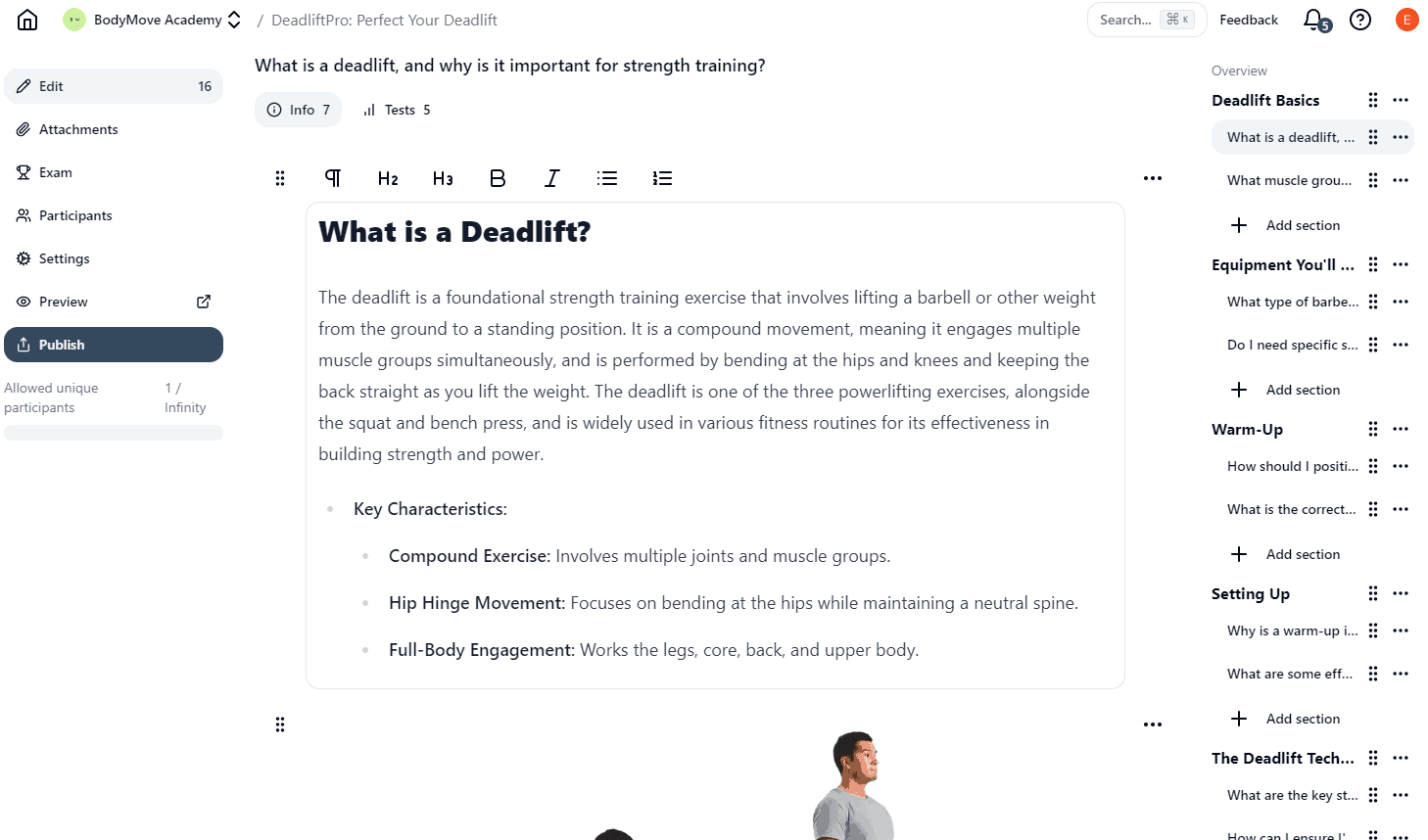We currently live in a fast-paced digital world, and the need for efficient and scalable learning solutions is only increasing. Organisations of all sizes are turning more and more towards Learning Management Systems (LMS) to streamline and enhance training programs.
However, if you’re not familiar with the meaning of LMS, it can be hard to wrap your head around why we’re seeing this increasing trend. In this article, we will provide a comprehensive overview of what an LMS is, how it works, its benefits, practical examples of its application, and guidance on selecting the right LMS for your organisation.

What is an LMS?
First and foremost, we want to establish the meaning of LMS, which stands for Learning Management System. This is a robust software platform designed to facilitate the administration, documentation, tracking, reporting, and delivery of educational courses, training programs, or online learning and development programs. It acts as a central hub for learners to access course materials, monitor their progress, and interact with educational content.
LMS features
- Content management: Create and manage courses, modules, and learning materials.
- Learning management: Track learning progress, performance, and completion rates.
- Assessment tools: Quizzes, tests, and assignments to evaluate the learner’s understanding and comprehension.
- Reporting and analytics: Detailed insights into learning trends and outcomes.
- Communication tools: Forums, messaging, and notifications to enhance interaction.
How does an LMS work?
An LMS is usually operated through a centralised platform accessible via a web browser or mobile app, allowing learners and administrators to easily and seamlessly interact with the system.
Here are some of the functions you will typically find in an LMS:
Course creation: Administrators can create courses using a variety of media formats, including videos, text, and interactive quizzes. For instance, our FrontCore LMS allows easy multimedia content integration to create engaging learning experiences.
User enrollment: Learners can enrol in courses either manually by administrators or through self-registration, which can be streamlined via integration with other HR systems.
Learning pathways: Courses are structured in a manner that guides learners through the content systematically, often utilising prerequisites and progression tracking.
Tracking progress: The LMS continuously monitors learner engagement, tracking metrics such as time spent on course materials, quiz scores, and completion rates.
Feedback and evaluation: Quizzes and assessments provide immediate feedback to learners and generate data for administrators to analyse learner performance.
Certification: Upon successfully completing courses, learners can receive certificates that are customizable and automatically issued by the LMS.
An example of a course builder in FrontCore LMS, showing the course structure for an e-learning course about deadlifting.
Glossary of terms
Blended learning: A mix of traditional face-to-face and online learning.
SCORM: A set of technical standards for eLearning software products.
Gamification: The use of game elements (points, badges) to enhance learner engagement.
API: Application Programming Interface, allows the LMS to interact with other software.
LTI: Learning Tools Interoperability, standard for integrating third-party tools into an LMS.
Benefits of an LMS
Implementing a Learning Management System (LMS) offers numerous benefits that helps to significantly enhance the organisational training and development processes. Let’s have a closer look at the specific benefits of using an LMS.
Cost-effectiveness
Every business has an ambition to reduce unnecessary costs, no matter what industry you’re in. With an LMS, you can drastically reduce the costs associated with traditional training methods, such as travel, printed materials, and venue rentals.
By providing digital access to training resources, your business can minimise these expenditures while still delivering comprehensive educational programs.
Enhanced accessibility and flexibility
Learners can access course materials whenever they want, from anywhere in the world, which is particularly beneficial if you have remote or global teams. This flexibility allows employees to engage with training content at their own pace, leading to higher completion rates and better knowledge retention.
Scalability
Most LMS’s can easily accommodate an ever-growing number of users and courses without significant additional costs or logistical challenges. This scalability guarantees that as your business or organisation grows, your training programs are able to expand accordingly.
This growth aligns with the projected expansion of the LMS market, expected to reach $28.1 billion by 2025¹, driven by the rising adoption of digital learning, government initiatives, and advancements in AI and machine learning.
Centralised learning environment
All training materials, learner records, and assessment results are stored in one centralised location. This simplifies management tasks and ensures consistency in training delivery across the organisation.
Personalization and adaptability
The modern LMS platforms offer personalised learning paths tailored to individual needs and preferences. Features like adaptive learning can adjust the difficulty and pace based on the learner’s performance, enhancing engagement and effectiveness.
Improved compliance management
For industries with strict regulatory requirements, an LMS ensures that all employees complete mandatory training on time. The system can help with compliance tracking and provides automated reminders, minimising the risk of non-compliance and associated penalties.
Engagement through gamification
Gamification elements such as badges, leaderboards, and points can make learning more engaging and motivating. These features can boost participation and foster a competitive yet collaborative learning environment.
Advanced reporting and analytics
Lastly, an LMS offers detailed insights into learning trends, completion rates, and performance metrics. These analytics enable your business to make data-driven decisions to constantly improve your training programs. As an example, the FrontCore LMS offers robust tracking and reporting features, simplifying the process of monitoring learner progress and evaluating the effectiveness of training programs.
Take advantage of the marketing module in your TMS
Practical examples of how to use a learning management system
Because of these benefits, implementation of an LMS can transform various aspects of your business’ organisational training and development. We have gathered some of the top practical examples of how to use an LMS:
Employee onboarding
One of the main ways to leverage an LMS is to streamline the onboarding process by providing new hires with structured training programs that introduce company policies, procedures, and culture. Not only does this help to give the employee a nice and comfortable start in their new role, it will also help to automate onboarding workflows to ensure a consistent experience for all new employees.
Compliance training
Ensuring that all employees complete necessary safety and regulatory training is critical for many organisations. An LMS tracks completion and provides certificates to demonstrate compliance. This is particularly useful in highly regulated industries such as healthcare, finance, and manufacturing.
Professional development
Offering ongoing professional development courses helps keep employees’ skills up-to-date. An LMS supports various learning formats, from microlearning modules to comprehensive certification programs. Employees can engage in continuous learning, which enhances their skills and keeps them abreast of industry trends. Notably, approximately 90% of students prefer online learning methods over traditional ones², highlighting the effectiveness of LMS platforms in continuous education, which can also be translated into the work environment.
Sales training
Sales teams can benefit from targeted training programs that enhance product knowledge, sales techniques, and customer service skills. An LMS can deliver training content that the sales staff or business developers can access on the go, ensuring they are always equipped with the latest information and strategies.
Customer training
An LMA can also be used for external learning, by educating customers about product features, best practices, and troubleshooting can enhance user satisfaction and loyalty. For example, the LMS can host product tutorials, user guides, and troubleshooting videos, reducing the burden on customer support teams and thus empowering the customer to get the most out of their products.
How to choose the right LMS
We have covered how an LMS works and the benefits of it, as well as practical examples of how to use it. So, how do you choose the right one? Here are key considerations to help you make the right decision:
1. Defining your goals and objectives
Identify what you need from an LMS. Are you focusing on employee training, customer education, or both? Clearly defining your primary objectives and use cases will help you select an LMS that aligns with your specific needs.
2. What features are essential to you?
Ensure the LMS offers critical features such as course creation, learner tracking, reporting, and integration capabilities.
3. User experience
The platform should be intuitive and easy to navigate for both administrators and learners. A user-friendly interface reduces the learning curve and increases engagement, allowing users to easily access and interact with training content.
4. Integration capabilities
Make sure that the LMS can be seamlessly integrated with your existing systems, such as an HR software, CRM, and other tools. Integration capabilities are essential for creating a unified learning ecosystem and streamlining the administrative processes.
5. Support and training
Another factor that is worth considering is support accessibility. We advise you to look for a provider that offers excellent customer support and comprehensive training resources. Reliable technical support is crucial to make sure that any issues are promptly addressed, minimising disruptions to your training programs. In FrontCore we offer dedicated customer support to help you maximise the effectiveness of your LMS.
6. Scalability
We also recommend choosing an LMS that can grow with your organisation’s needs. The system should be able to handle increasing numbers of learners and expanding course catalogues without compromising performance. Scalability ensures that the LMS remains effective as your organisation evolves.
This is crucial given the widespread global adoption of LMS platforms, with North America leading in usage and Europe, Asia Pacific, and Latin America showing significant growth³. Each region has unique drivers, such as mobile learning in Latin America and improving educational resources in Asia.
7. Pricing
Lastly, you should consider your budget, both for initial setup costs and ongoing maintenance fees. Evaluate the value offered by the LMS in terms of features, support, and scalability. Flexible pricing plans can help accommodate different budgets, allowing you to receive the best return on investment.
Explore the pricing options for FrontCore LMS here!
FAQ
What is the cost of an LMS?
Costs vary widely based on features, number of users, and implementation requirements. It’s important to consider both initial setup costs and ongoing maintenance fees. Some LMS providers, like we do in FrontCore, offer flexible pricing plans to accommodate different budgets.
Can an LMS be customised?
Yes, most LMS platforms offer customisation options to align with your organisation’s branding and specific training needs. FrontCore’s LMS, for example, allows for extensive customisation to create a tailored learning environment.
How secure is an LMS?
Security features such as data encryption, user authentication, and regular backups are standard in most LMS platforms to protect sensitive information. It’s crucial to choose an LMS with robust security protocols to ensure data integrity and privacy.
Is technical support available?
Reputable LMS providers offer comprehensive support, including onboarding assistance, troubleshooting, and regular updates. FrontCore provides dedicated customer support to help you maximise the effectiveness of your LMS.
Did you like this article? Don't forget to share it:








0 Comments